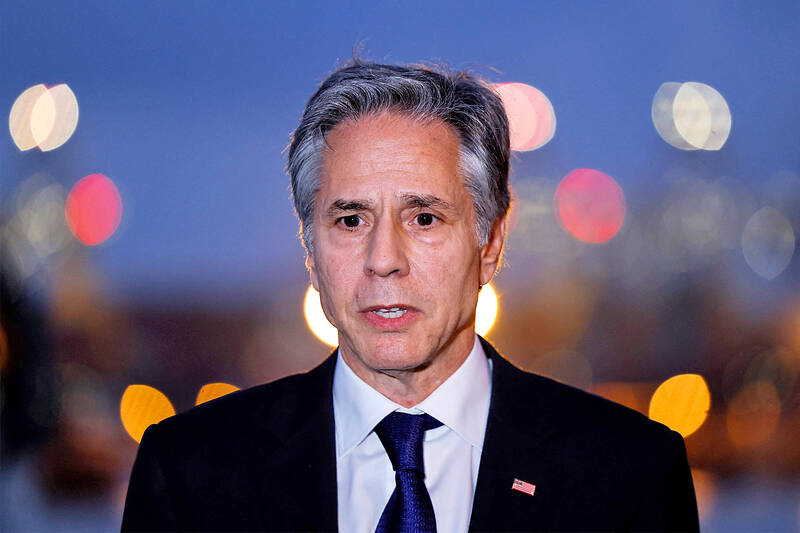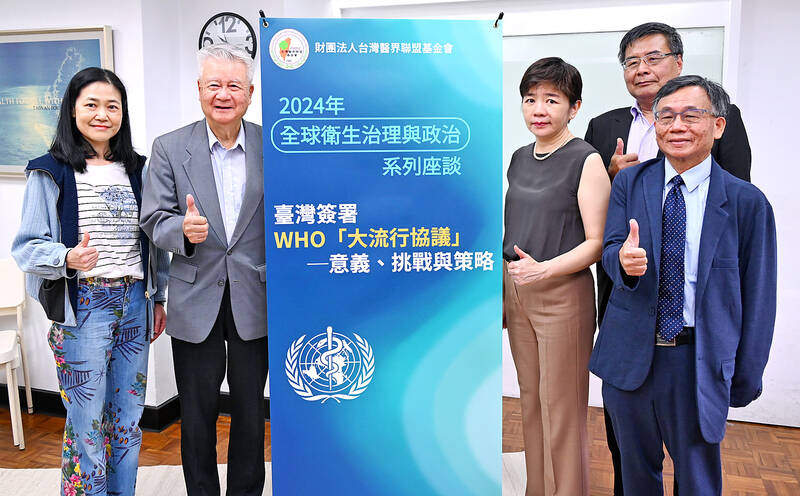US Secretary of State Antony Blinken in a statement published on Wednesday urged the WHO to invite Taiwan to participate in the upcoming World Health Assembly (WHA) as an observer.
The US “strongly encourages the WHO to reinstate an invitation to Taiwan to participate as an observer at this year’s WHA so the world may once again benefit from Taiwan’s expertise and experience,” the statement said.
The WHA, themed “All for Health, Health for All,” is to take place from May 27 to June 1 in Geneva, Switzerland.

Photo: AFP
Taiwan has not been invited to the WHA since 2017, as China has become more aggressive in opposing the nation’s participation in international forums after President Tsai Ing-wen (蔡英文) took office in May 2016.
“Inviting Taiwan to observe the WHA is a critically important step toward affirming the WHO’s goal of ‘Health for All,’” Blinken said.
With “exceptional capabilities and approaches,” Taiwan has repeatedly demonstrated “a capability and willingness to help address global health crises and support the global health community,” he said.

Photo: Liu Hsin-de, Taipei Times
Excluding Taiwan from the WHA “undermines inclusive global public health cooperation and security, which the world demands — and urgently needs,” he said.
Meanwhile, the Foundation of Medical Professionals Alliance in Taiwan yesterday called on the nation’s diplomatic allies to support its involvement in the WHO pandemic agreement.
WHO member states are to discuss the world’s first pandemic agreement during the WHA.
The agreement includes mechanisms such as transfers of technology and know-how, access and benefit sharing, and a global supply chain and logistics network to facilitate information sharing and provide technological support during global pandemics.
Taiwan should strive for the opportunity to be a contracting party to the agreement, foundation executive director Lin Shih-chia (林世嘉) told a forum in Taipei.
The nation can solicit support from its allies to negotiate on allowing all countries, economies and health entities to join the agreement, Lin said.
If Taiwan cannot take part in the agreement, it should still hope to take part in the meetings and the contracting parties’ technical mechanisms as an observer, she said.
The revised draft of the agreement, which was released in March, states that the document “shall be open for signature by all states and by regional economic integration organizations.”
Taiwan should seek to participate as a member of regional organizations, National Taiwan University College of Public Health professor Tony Chen (陳秀熙) said.
Separately, the Oklahoma Legislature and the Illinois House of Representatives this week passed resolutions to support Taiwan’s meaningful participation in international organizations.
The Oklahoma Senate introduced a concurrent resolution, which was adopted by both of its chambers on Wednesday, to encourage “further economic ties and friendship between the state of Oklahoma and Taiwan.”
The state supports Taiwan’s meaningful participation in international organizations, including the Indo-Pacific Economic Framework for Prosperity, the International Civil Aviation Organization, the International Criminal Police Organization and many others, the bill says.
Oklahoma and the rest of the US “have benefited immeasurably through decades of unwavering friendship with Taiwan, and the wider world is sure to reap tremendous rewards as Taiwan works to enhance its presence in the international community,” it says.
Illinois Representative William Davis, cochair of the state’s Taiwan Friendship Caucus, proposed a resolution to reaffirm the state’s commitment to boosting ties with Taiwan.
The Illinois bill also voices support for the nation’s meaningful participation in international organizations, as well as “Taiwan’s aspiration to make more contributions in international societies.”
Adopting a policy of “steadfast diplomacy,” Taiwan “is capable of fulfilling, and willing to fulfill, its responsibilities and to collaborate with the world to deal with the challenges of humanitarian aid, disease control, and so forth,” it says.
The bill was adopted by the Illinois House on Tuesday.
Additional reporting by CNA

Conflict with Taiwan could leave China with “massive economic disruption, catastrophic military losses, significant social unrest, and devastating sanctions,” a US think tank said in a report released on Monday. The German Marshall Fund released a report titled If China Attacks Taiwan: The Consequences for China of “Minor Conflict” and “Major War” Scenarios. The report details the “massive” economic, military, social and international costs to China in the event of a minor conflict or major war with Taiwan, estimating that the Chinese People’s Liberation Army (PLA) could sustain losses of more than half of its active-duty ground forces, including 100,000 troops. Understanding Chinese

The Ministry of Foreign Affairs (MOFA) yesterday said it is closely monitoring developments in Venezuela, and would continue to cooperate with democratic allies and work together for regional and global security, stability, and prosperity. The remarks came after the US on Saturday launched a series of airstrikes in Venezuela and kidnapped Venezuelan President Nicolas Maduro, who was later flown to New York along with his wife. The pair face US charges related to drug trafficking and alleged cooperation with gangs designated as terrorist organizations. Maduro has denied the allegations. The ministry said that it is closely monitoring the political and economic situation

UNRELENTING: China attempted cyberattacks on Taiwan’s critical infrastructure 2.63 million times per day last year, up from 1.23 million in 2023, the NSB said China’s cyberarmy has long engaged in cyberattacks against Taiwan’s critical infrastructure, employing diverse and evolving tactics, the National Security Bureau (NSB) said yesterday, adding that cyberattacks on critical energy infrastructure last year increased 10-fold compared with the previous year. The NSB yesterday released a report titled Analysis on China’s Cyber Threats to Taiwan’s Critical Infrastructure in 2025, outlining the number of cyberattacks, major tactics and hacker groups. Taiwan’s national intelligence community identified a large number of cybersecurity incidents last year, the bureau said in a statement. China’s cyberarmy last year launched an average of 2.63 million intrusion attempts per day targeting Taiwan’s critical

‘SLICING METHOD’: In the event of a blockade, the China Coast Guard would intercept Taiwanese ships while its navy would seek to deter foreign intervention China’s military drills around Taiwan this week signaled potential strategies to cut the nation off from energy supplies and foreign military assistance, a US think tank report said. The Chinese People’s Liberation Army (PLA) conducted what it called “Justice Mission 2025” exercises from Monday to Tuesday in five maritime zones and airspace around Taiwan, calling them a warning to “Taiwanese independence” forces. In a report released on Wednesday, the Institute for the Study of War said the exercises effectively simulated blocking shipping routes to major port cities, including Kaohsiung, Keelung and Hualien. Taiwan would be highly vulnerable under such a blockade, because it